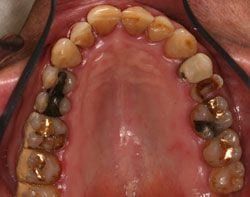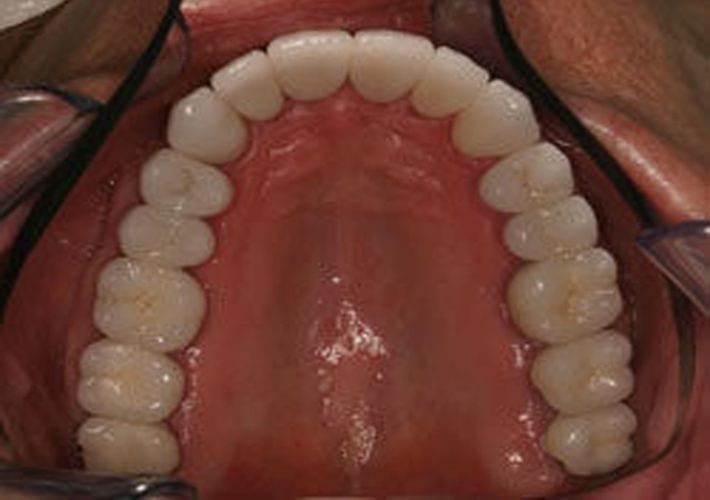
Full mouth rehabilitation improves the dental, skeletal and muscular function of your mouth. It is a comprehensive restoration process whereby multiple teeth in the front and the back of your mouth are restored. Through this procedure, our South Florida dental expert can replace missing teeth, establish a correct bite, protect teeth from improper wear, just to name a few of the many possible positive outcomes. The advanced techniques and spa-like atmosphere of The Sadati Center for Aesthetic Dentistry offers you an anxiety-free opportunity to completely restore your mouth and enjoy the smile you’ve always wanted.
Did You Know?
As many as 40 million Americans are missing all of their teeth and as many as 178 million Americans are missing at least one of their permanent teeth. Losing one or more teeth can have serious consequences to your oral health and can even affect your ability to retain the surrounding teeth. For this reason, many dentists recommend replacing missing teeth as soon as possible.
Symptoms Addressing the Need for Full Mouth Rehabilitation
This procedure is beneficial for those experiencing:
- Multiple missing teeth
- Severely worn-down teeth due to bruxism or other conditions
- Chronic jaw pain, headaches, or TMJ disorders
- Extensive tooth decay or significantly damaged teeth
- Complex dental issues requiring a multifaceted treatment approach
Why Full Mouth Rehabilitation?
- Comprehensive Solution: Addresses multiple dental problems simultaneously.
- Customized Treatment: Tailored to meet the unique needs of each patient.
- Improved Functionality: Restores the ability to eat and speak comfortably.
- Aesthetic Enhancement: Achieves a harmonious, attractive smile.
Treatment Process
Initial Consultation with Dr. Sadati
- Thorough Evaluation: Comprehensive assessment of dental health.
- Discussion of Goals: Understanding patient’s expectations and concerns.
Detailed Treatment Planning
- Diagnostic Mock-ups: Visual and functional planning tools.
- Customized Plan: Integrating various dental procedures for optimal results.
Step-by-Step Treatment
- Preparatory Procedures: Addressing any gum disease or foundational issues.
- Restorative Phase: Implementing crowns, bridges, veneers, implants, etc.
- Orthodontic Adjustments: Aligning teeth if necessary.
- Final Refinements: Ensuring comfort, function, and aesthetics.
Post-Treatment Care
- Follow-Up Visits: Monitoring progress and making necessary adjustments.
- Maintenance Plan: Guidance for long-term care and preservation.
Prevention
To maintain the results of full mouth rehabilitation:
- Adhere to a rigorous oral hygiene routine.
- Regular dental check-ups and cleanings.
- Avoid habits that can damage teeth, like teeth grinding or using teeth as tools.
Outlook
Patients undergoing full mouth rehabilitation can anticipate:
- A significant improvement in oral health and functionality.
- Enhanced overall appearance of their smile.
- Increased self-confidence and quality of life.
Frequently Asked Questions:
Am I a candidate for full mouth rehabilitation?
If you suffer from a variety of significant and complex restorative and cosmetic dental issues, West Palm Beach dentist Dr. Sam Sadati may recommend full mouth rehabilitation. To determine if you are an ideal candidate for full mouth rehabilitation, Dr. Sadati will perform an oral exam and take both dental xrays and a CBCT scan.
What can I expect when having full mouth rehabilitation?
Full mouth rehabilitation means that all the teeth in the mouth are restored. If there are some teeth missing, they can be restored with bridges or dental implants. If there are non-restorable teeth in the mouth, then they will need to be extracted and replaced with dental implants. When dental implants are placed, a bone graft may also be required to ensure the jawbone has enough bone mass to support dental implants. Once the implants are placed, they will need to heal and fuse with the surrounding bone. This process, known as osseointegration, can last around 3-6 months. After the implants have fused with the bone, then the permanent restoration can be placed. There are several options for the final restorations that will be anchored and secured to the supporting implants.
What can I expect during recovery?
After your dental implants have been placed, you may experience some swelling and mild discomfort for the first few days. In most cases, any discomfort can easily be managed with over the counter pain medications since there are very few nerves in the jawbone. In order to prevent implant failure, you can also expect to be on a temporary soft foods diet. This is to ensure that the implant does not shift during the healing process as a result of too much pressure. As the implant heals, your dentist will gradually reduce your dietary restrictions. Once the implant has fused with the surrounding bone, you can return to your usual diet. While it can take around 3-6 months for fusion to occur, many patients state that the final results are more than worth the wait.
Begin Your Dental Transformation Journey
If you’re considering full mouth rehabilitation, contact us at 888-873-3558 for a consultation with Dr. Sadati. At The Sadati Center for Aesthetic Dentistry, we’re committed to restoring your smile and dental health with personalized, comprehensive care.


